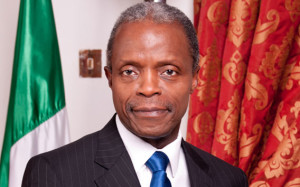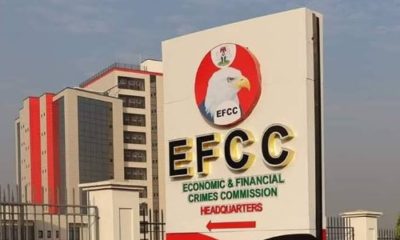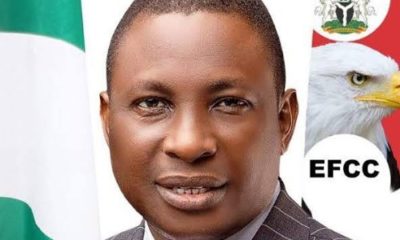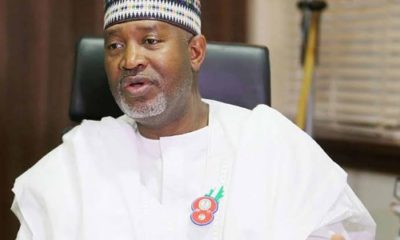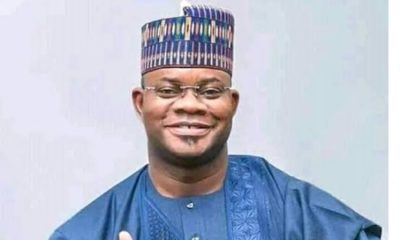Oil
$2bn Malabu oil deal probe: Adoke writes Osinbajo, defends transfer of cash to Malabu

By Gbenga KOSOKO
ABUJA— AS the controversy over the $2 billion Malabu oil deal resurfaces, the immediate past Attorney General of the Federation, Mr. Mohammed Adoke, has said his office facilitated the settlement agreement between feuding parties and the Federal Government in the interest of Nigeria.
Former attorney General of the Federation and Minister of Justice, Mohammed Adoke has dispatched a detailed explanation to the Vice President, Mr Yemi Osinbajo, on how the decision to settle out of court between the parties involved in the multi-billion deal was reached and why the Federal Government of Nigeria was paid a pittance of $210 million out of the $2 billion.
Adoke’s explanation comes on the heels of his invitation by the Economic and Financial Crimes Commission, EFCC, to explain how the decision to pay a whopping sum of money to certain individuals and entities named in the Malabu oil deal was reached, who determined the ratio of sharing and why the government got a negligible fraction of the huge payout.
It was learned, last night, that Adoke and many other top Nigerians, including a former National Security Adviser and Finance Minister, might be summoned to speak on their roles in the sharing of the cash, which many believed went into the hands of vested interest and largely short-changed the Federal Government of Nigeria.
But Adoke insisted in a six-page document obtained by Vanguard that he acted in the overall best interest of Nigeria to prevent a protracted litigation that would have left Nigeria in a bad shape and lowered its image, given the international dimension the matter had assumed before his appointment.
The former Justice minister insisted that any responsible Attorney General of the Federation would have done what he did to safeguard the interest of the country and avoid a liability that potentially stood against it. Adoke stated that given the threat from Shell to sue the government over loss of over $2 billion and the loss of investments, he had to encourage a definitive resolution between the parties, who had expressed an intention to settle out of court but were untrusting of each other, given their antecedents.
He said as at the date of the settlement in 2006 and the resolution agreement in 2011, OPL 245 had been exclusively vested in Malabu and subjected to the conditions spelled out in the allocation of the oil bloc. According to him, the interest of the Federal Government at the time of the resolution in 2011 was to ensure the payment of the signature bonus on the bloc and that the bloc was developed to enable the country earn revenue through royalty and taxes. FG only entitled to $210m signature bonus Part of the letter read:
“That consistent with Nigerian law governing oil and gas and the allocation of oil blocks, the signature bonus due and payable to the FGN amounting to $210 million was duly paid and acknowledged. “The taxes and royalties associated with oil produced from the block are also now being paid. This is contrary to the lies and misinformation being peddled that Nigeria was short changed in the transaction.
“That at all times material to the resolution of the disputes between Malabu/Shell/FGN and one Mohammed Sani, who now claims to be Mohammed Abacha, was not a party to the transaction and did not disclose any personal or family interest in OPL 245 to the administration of Gen Abdulsalami Abubakar or to the administration of President Olusegun Obasanjo.
Mohammed Abacha not party to deal “That Mohammed Abacha did not participate in the negotiations leading to the resolution or settlement agreements; that Mr. Abacha surfaced only after the tripartite resolution of the matter between Shell/Malabo and the FGN to request that the Office of the Attorney General of the Federation should prevail on the main shareholder of Malabu to respect their interests in Malabu by paying them part of the proceeds.
” Adoke said it was wrong to assume that the money accruable for Malabu belonged to the Federal Government and asked those who thought so to perish their thoughts. He said: “It is, therefore, incorrect and contrary to as widely claimed in some quarters, that the money paid to Malabu, which was only warehoused in an escrow account, was meant for the Nigerian Government and that the country was, thereby, short-changed.
“Malabu, as title-holder of the oil bloc, merely dispensed of her interest in it as allowed by law. This, indeed, is the case with similar oil blocs allocated to several notable Nigerians who also disposed of their interests to oil multinationals and are enjoying the proceeds without any eyebrow or allegations of corruption.
” Appeal to vice president While absolving himself of any wrongdoing in the matter, Adoke asked the Vice President to use his office to protect the office of the AGF from mischief makers and politicians. He also drew the attention of the Vice President to the fact that Shell and other firms involved in the deal had breached the laws of their home countries, either by non-disclosures and or tax evasion, Nigeria should assist such countries to ascertain the truth and not to criminalise public office holders to satisfy what he called “narrow interests” of shareholders fighting over the assets of their company.
History of Malabu Oil Prospecting License (OPL) 245 which was granted to Malabu Oil and Gas Limited by the administration of General Sani Abacha, GCFR in 1998, was subsequently revoked by the administration of President Olusegun Obasanjo in 2001 and re- allocated to Shell Nigeria Ultra Deep Limited (SNUD) in 2002 under a Production Sharing Contract (PSC) arrangement. But at the time of revocation and re-award, Malabu and SNUD had a binding Joint Operating Agreement to exploit the block with SNUD as technical partner to the Venture.
Deeply aggrieved over the revocation, Malabu petitioned the House of Representatives Committee on Petroleum, which after a public hearing, condemned the revocation and re- allocation to SNUD and recommended that the block be restored to Malabu. Strengthened by the House position, Malabu also sued the Federal Government of Nigeria and SNUD at the FHC in Suit No FHC/ABJ/CS/420/2003 claiming several declaratory reliefs including an order setting aside the re-allocation to SNUD and a restoration of the block to Malabu.
The suit was struck out but on appeal, the parties entered into a settlement dated 30th November 2006 which were executed by Chief Bayo Ojo, SAN, the then AGF. The terms of Settlement were filed in court as consent judgment and a key term in the settlement was the restoration of the Oil block 245 to Malabu by the federal government.
-Vanguard-
Oil
NNPC Discovers Over 4,800 Illegal Pipeline Connections

The Nigerian National Petroleum Company (NNPC) Limited has revealed the detection of more than 4,800 unauthorized connections on oil pipelines within the country, painting a troubling image of the nation’s primary source of revenue.
Mele Kyari, the Group Chief Executive Officer of NNPC Ltd, communicated this information to the Senate Committee on Appropriations last Friday.
He said, “We have over 4,800 illegal connections on our pipelines. That means in some lines, within 100 kilometres of pipelines, you have as much as 300 insertions.
“Therefore, even when you produce the oil, you cannot deliver them at the required pressure and therefore the volume will also be less.”
As per the NNPC Ltd chief, individuals from various regions enter the Niger Delta, inserting unauthorized connections on pipelines in Nigeria’s oil-producing area.
This recent revelation follows a prior discovery of 295 illegal connections to the pipelines by the firm a year ago, underscoring the escalating issue of crude oil theft in Nigeria.
Two years earlier, Kyari had highlighted the country’s daily loss of 200,000 barrels of oil, amounting to $13 million due to theft and vandalism.
He further stated “We have two sets of losses, one coming from our products and the other coming from crude oil. In terms of crude losses, it is still going on. On the average, we are losing 200,000 barrels of crude every day.”
After the discovery, Nigeria’s security forces pledged to enhance security around the country’s pipelines.
To bolster this, the Federal Government granted a multi-billion naira pipelines surveillance contract to Tantita Security Services, headed by former militant leader Government Ekpemepulo, also known as Tompolo.
Despite facing criticism for this decision, Senator Heineken Lokpobiri, the Minister of State for Petroleum, remains convinced that it was the appropriate course of action.
In August, following a tour of oil facilities in the Niger Delta, Senator Heineken Lokpobiri expressed gratitude to Tantita, commissioned by NNPC Ltd, for their ongoing work.
He also hinted at plans for further extensive endeavors in the future.
In 2021, after extensive debate and delays, the Petroleum Industry Bill was finally passed to attract increased foreign investment into the oil sector through amendments to regulations, royalties, and taxes.
Oil
Dangote Refinery Set To Begin Fuel Production With First Crude Arrival

Nigeria’s colossal $19 billion Dangote Refinery, after encountering several setbacks, is on the verge of kickstarting fuel production.
This achievement is heralded by the arrival of the first crude shipment, transported by the OTIS tanker carrying 950,000 barrels of Nigeria’s Agbami crude.
S&P Global, citing industry sources and tanker tracking data on spglobal.com, reported the tanker’s departure on December 6, en route to Lekki, the nearest land port to Dangote’s offshore crude receiving terminal.
Scheduled to reach its destination around 8 PM on December 7, the arrival of this shipment signifies the commencement of crude supplies for the refinery’s operations.
Chartered by the state-owned Nigerian National Petroleum Company (NNPC), the Suezmax tanker is an emblem of the initial crude supply to Dangote’s cutting-edge refinery, as disclosed by a West African oil trader familiar with the matter in the S&P report.
Even though the refinery was officially completed in May, the absence of domestic crude feedstock had hindered oil product manufacturing.
To address this, the NNPC, holding a 20% stake in the refinery, struck an agreement to provide 6 million barrels of crude oil as feedstock to the Dangote refinery in December.
This move aims to jumpstart operations and overcome the previous impediments.
Agbami, operated by Chevron, holds a prominent position among Nigeria’s major deepwater developments, producing around 100,000 barrels per day in the central Niger Delta.
Known for its light sweet crude qualities, with a specific gravity of 47.9 API and a low sulfur content of 0.04%, Agbami produces substantial amounts of naphtha and kerosene.
NNPC has chartered additional shipments from different Nigerian offshore fields to the refinery, marking the start of a sequence of planned crude supplies for the month, as mentioned by the oil trader.
Located on the outskirts of Lagos, Nigeria’s commercial hub, the Dangote Refinery encountered repeated delays since its 2013 announcement, despite significant installation progress in 2019.
The refinery, designed to handle multiple crudes simultaneously, targets three Nigerian crude grades—Escravos, Bonny Light, and Forcados. When operating at full capacity, it aims to produce 327,000 barrels per day (b/d) of gasoline, 244,000 b/d of gasoil/diesel, 56,000 b/d of jet fuel/kerosene, and 290,000 metric tons per year of propane/LPG.
Dangote’s operations starting signify Nigeria’s hopes to lessen its reliance on gasoline imports, addressing the deficiencies of its existing refineries undergoing repairs. This shift is poised to reshape Nigeria’s oil industry, potentially leading to gasoline self-sufficiency by the 2040s.
Dangote officials anticipate an initial output of 370,000 barrels per day (b/d), emphasizing jet fuel and diesel production.
Industry analysts, however, project the refinery to reach its full operational capacity by mid-2025, although potential delays remain a looming concern.
Oil
NNPCL Sets Dec 2024 Terminal Date For Fuel Importation

The Nigerian National Petroleum Company Limited (NNPCL) has announced intentions to cease importing refined petroleum products by December 2024, anticipating full operational functionality for all national refineries by that time.
Group CEO, NNPC Ltd, Mele Kyari, shared this at a meeting with Speaker Tajudeen Abbas of the House of Representatives, who advocated for the privatisation of Nigeria’s refineries on Thursday.
Projections indicated the national oil firm’s revenue could climb to N4.5 trillion by the conclusion of 2023. Moreover, the rehabilitation of the Port Harcourt Refining Company, managed by NNPCL, was slated for completion by December of the current year.
Meanwhile, Oil marketers verified on Thursday that the Port Harcourt refinery is set for operations, potentially starting in January 2024. They emphasized that once operational, this refinery could notably reduce the prices of refined petroleum products.
During the meeting in Abuja, Kyari asserted Nigeria’s intention to cease importing refined petroleum products by 2024, envisioning the country’s emergence as a net exporter of these commodities within the same year.
He outlined the plans for launching operations at the Port Harcourt, Warri, and Kaduna refineries.
Kyari reiterated that all refineries would operate at full capacity, ultimately paving the way for Nigeria to transition into a net exporter of petroleum products by the conclusion of 2024.
He attributed the inactivity of Nigeria’s refineries over the years to the petroleum subsidy, emphasizing that the removal of this subsidy was drawing significant private-sector investments into the sector.
Kyari said “I can confirm to you that by the end of December this year, we will start the Port Harcourt refinery; early in the first quarter of 2024, we will start the Warri refinery and by the end of 2024, Kaduna refinery will come into operation.
“This is the commitment we are giving today and you can hold us accountable for this. In 2024, many of the initiatives including the rehabilitation of our refineries and also the efforts of small-scale refineries, and the upcoming Dangote refinery, will make Nigeria a net exporter of petroleum products in 2024.
“We will no longer be talking about fuel importation by the end of 2024. I am very optimistic that this will crystallise.
Kyari promised that by the conclusion of 2023, the government’s anticipated revenue from the company would reach N4.5 trillion, emphasizing NNPCL’s adherence to the Petroleum Industry Act and its commitment to delivering value to shareholders.
Recall that in October 2023, it was reported that Nigeria’s monthly spending on the importation of Premium Motor Spirit, known as petrol, had reached approximately N843 billion due to NNPCL’s cessation of oil swaps.
In July of this year, the Nigerian Midstream and Downstream Petroleum Regulatory Authority reported that during the post-deregulation period, spanning June 1 to June 28, 2023, the country’s total petrol consumption amounted to 1.36 billion litres, with an average daily consumption of 48.43 million litres.
The average ex-depot price of petrol, sourced solely from NNPCL as the importer, stands at about N580 per litre.
However, both NNPCL and oil marketers declared on Thursday that this substantial oil import expenditure would soon diminish.
They anticipated a drop once the Port Harcourt refinery commences production of refined petroleum products from January 2024, barring any unforeseen circumstances.

